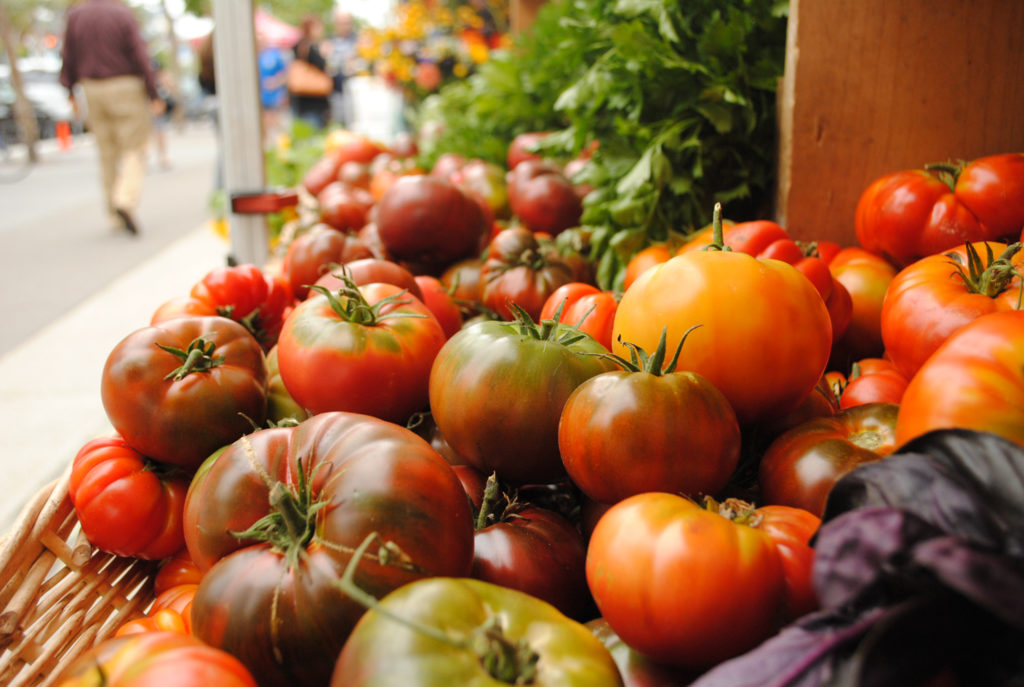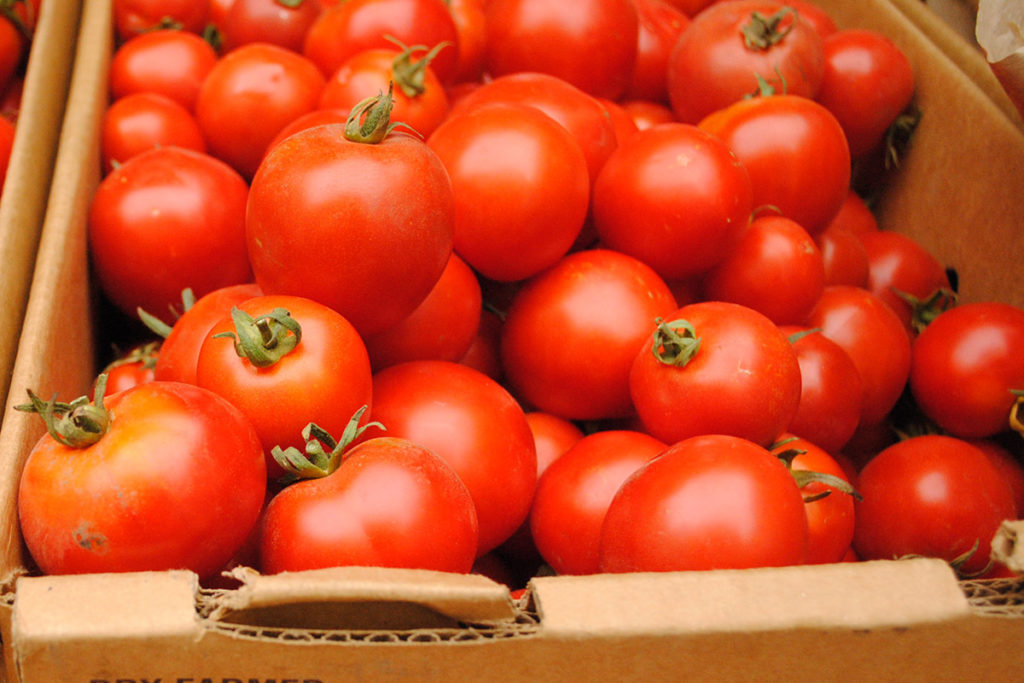The Great Tomato Debate
Brie Mazurek, Foodwise Staff
July 25, 2014

With their rainbow colors and odd shapes and sizes, the appeal of heirloom tomatoes is undeniable. But more than just a pretty face, these darlings of the summer farmers market also represent diversity and freedom in our food supply.
“People ask me, ‘Is this heirloom or hybrid?’” says farmer Bill Crepps of Everything Under the Sun, who grows more than 20 varieties of tomatoes. “You can tell that there’s something they don’t like about the word ‘hybrid.’”
Bill recognizes the allure of heirlooms, but he also thinks that hybrids have received a bad rap, in part because people confuse them with GMOs. He believes that hybrids hold an important place on small, diverse farms. “I grow heirlooms for their variety, but I rely on hybrids for their disease resistance,” he says.
Seeds with Heritage
Most people associate “heirloom” with big, juicy slicing tomatoes like Brandywine, Black Krim, and Marvel Stripe, but heirlooms come in all shapes and sizes, including the San Marzano paste tomato.
Heirlooms are varieties whose seeds have been saved by farmers and gardeners and passed down for generations, usually 50 years or more. They are open-pollinated, which means that they can be pollinated through natural mechanisms (such as insects, birds, and wind) and still breed true-to-type. Their seeds can be saved and replanted with fairly consistent results, and they tend to be genetically diverse, making them more adaptable to different growing conditions. Unlike hybrids and GMOs, heirlooms and other open-pollinated varieties cannot be patented.
In the 1980s, Ben Lucero of Lucero Organic Farms set out to develop his own tomato when he discovered that one of his tomato plants’ seeds yielded an array of unusual offspring. After about five years of isolating the good plants, saving their seed, and replanting, he created his own variety called the Ivory Pear, a pale yellow, pear-shaped cherry tomato bursting with flavor. Though still too young to technically be an heirloom, Ben’s Ivory Pear is sold in seed catalogs that specialize in heirlooms.
These days, Ben gets most of his seed from such catalogs. “I save some seeds that are harder to get, and I would save more if it came down it, but I don’t really have the time,” he says.
Hybrid Hype
In contrast to open-pollinated seed, hybrid seed is created by cross-pollinating two different varieties to yield offspring with desirable traits from both parent plants, such as disease resistance, uniformity, and high yield—a phenomenon known as “hybrid vigor.” Early Girl, Sun Gold, and Juliet are just a few of the popular hybrid tomatoes found at the farmers market.
Hybrids should not be confused with GMOs. While hybrids are crossed manually in the field, GMOs are created using high-tech methods such as gene splicing, sometimes combining genes from different species to yield organisms that could not occur in nature.
While some argue that hybrids are more reliable and hardy than heirlooms, hybrids also have serious drawbacks. Seeds from a first-generation hybrid (called “F1”) are not genetically stable, which means that farmers cannot save and plant them with reliable results, so they must buy new seeds each year. Seed companies that hold the patents can control their production—a big sticking point for farmers and eaters concerned about corporate consolidation in the food system.
Early Girl ≠ GMO
Farmer Joe Schirmer at Dirty Girl Produce has been growing hybrid Early Girl tomatoes in Santa Cruz since 2000. With its thick skin, compact round shape, and deeply concentrated flavor, the dry-farmed Early Girl has earned a cult following in the Bay Area. But Joe has also noticed backlash against the tomato in recent years.
“People are saying, ‘Early Girl is made by Monsanto,’” says Joe. “It’s not.”
The variety was originally developed in France and distributed by a company called Petoseed, which was later acquired by Seminis. In 2005, Seminis was acquired by Monsanto, a company well known for its GMO crops, muddying the Early Girl’s pedigree and leading some eaters to mistakenly think the tomato is genetically modified. (The patent has expired, but the Seminis still controls the parent stock.)
Joe sees the GMO debate as obscuring deeper problems, such as corporate control our food system and overuse of pesticides in industrial agriculture. “If everyone wants to boycott Monsanto, they’re going to have a hard time. They own lots of seed companies as investments,” says Joe. “They’re patent trolls. They want to own anything they can, so that farmers rely on them to buy it every year.”

A New Girl on the Block
About six years ago, Joe started saving seed from his Early Girls. “It was more out of curiosity than anything else,” he says. “And of course there’s also the idea of seed security, and not having to rely on seed growers for seed.”
Plus, Joe wanted to see if he could breed a tomato that would be better suited to his coastal climate and resistant to Phytophthora, a type of mold that can wipe out a whole tomato crop. After one of his plots was hit with the disease, Joe cleared the field but some of the plants had seeded, leaving a new generation to grow. “I pretty much saw every kind of tomato imaginable—big ones, little ones, spindly plants that were dying—but there were a few plants in the mix that were just perfect.”
Joe cleared out the oddballs and left the good ones to grow, then saved their seeds. When he replanted the next year, there was a higher percentage of good tomatoes, and even more the following year. Several generations later, he had created his own open-pollinated Early Girl spinoff, which he dubbed the Dirty Girl.
Hybrid to Heirloom?
This year Joe planted 3,000 Dirty Girl plants, in addition to 70,000 dry-farmed Early Girl plants, and he started bringing a small crop of Dirty Girls to the farmers market for a trial run.
While the Dirty Girl is becoming more vigorous and uniform, and the flavor and texture are on par with its hybrid ancestor, Joe thinks it has a long way to go for the genetic line to stabilize.
Will the Dirty Girl ever replace the Early Girl on Joe’s farm? It’s too early to say. “If over the next 10 years, I could get it to a place where I felt like it was out-producing in yield, flavor, and quality and wasn’t prone to Phytophthora, then great. But I’m nowhere near that,” says Joe.
Like Ben’s Ivory Pear, the Dirty Girl may be on its way to heirloom status, but until then, Joe will continue to buy hybrid Early Girl seed, which offers the most reliable crop. “I have no problem with Early Girl,” he says. “But I wish that some other seed company that I could stand behind would produce them.”
Look for delicious tomatoes from Everything Under the Sun, Lucero Organic Farms, and Dirty Girl Produce at the Saturday and Thursday markets.
Topics: Farms, Fruit, Vegetables
